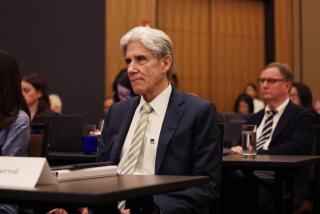Victoria Fromkin; UCLA Linguist, Vice Chancellor
Victoria A. Fromkin, an internationally known linguistics expert who taught at UCLA for 25 years and became the university’s first woman vice chancellor, has died. She was 76.
Fromkin, who co-wrote the best-selling textbook “An Introduction to Language,” which has been translated into six languages, died Wednesday in Los Angeles of colon cancer.
Known for her little notebook and careful ear for errors as well as for compiling the recent anthology “Linguistics: An Introduction to Linguistic Theory,” Fromkin personally collected more than 12,000 examples of slips of the tongue. While she acknowledged that they were often funny, she gathered them as evidence of how the brain processes language.
The scholar was adept at reeling off spoonerisms, the transposition of sounds named for the Rev. William A. Spooner (1844-1930), the Oxford professor who purportedly said such things as: “You have hissed all my mystery lectures . . . in fact, you have tasted the whole worm” instead of the more sensible, “You have missed all my history lectures . . . in fact, you have wasted the whole term.”
Even if she could spark laughter with her material, Fromkin was taken very seriously as an expert on the linguistic significance of speech errors, brain and language, phonetics and psycholinguistics.
Her reach extended far beyond the classroom and lecture platform. She was consulted as an expert on language by news media as well as educators and researchers, and when the questions didn’t get asked, she sometimes volunteered the answers anyway. After The Times sparked a debate in 1995 about possible language problems for toddlers raised by nannies who spoke a different tongue, Fromkin fired off a letter to the editor.
“Years of linguistic research show that children will learn any language to which they are exposed before puberty, and that learning or being exposed to a second or third or fourth language will not negatively affect the acquisition of any of them,” she reassured readers.
“Children of many countries grow up multilingual. . . . If our children were exposed to a second language through nannies and early in elementary school, they would grow up speaking more than one language properly. Their lives would certainly be enriched.”
Fromkin was president of the Linguistic Society of America, chairwoman of the board of governors of the Academy of Aphasia, and an executive board member of the Permanent International Committee of Linguists.
After joining the UCLA linguistics faculty in 1965, she chaired the department from 1973 to 1977 and was dean of the UCLA graduate division from 1979 to 1989.
From 1980 to 1989, Fromkin was vice chancellor of graduate programs, the first woman in the UC system to hold that rank. She was also the first woman president of the Assn. of Graduate Schools in the American Assn. of Universities.
Fromkin came late to linguistics. Born in Passaic, N.J., the former Victoria or “Vicki” Landish studied economics at UC Berkeley. But after she married Jack Fromkin, she became a housewife and mother, raising their son, Mark.
Enrolling at UCLA in the early 1960s, she had no interest in picking up her economics discipline. A professor suggested linguistics, and she earned a master’s degree in the subject in 1963 and her doctorate two years later.
Fromkin, who formally retired in the early 1990s but continued her research and writing, earned the UCLA Harvey L. Eby Award for the Art of Teaching and the school’s Alumni Assn. Professional Achievement Award.
She is survived by her husband, Jack Fromkin, who has asked that memorial donations be made to the UCLA Foundation for the Mark Fromkin Memorial Fund, c/o Tim Kawahara, UCLA Alumni Assn., James West Alumni Center, Los Angeles, CA 90095-1397.
The Fromkins started the fund, which provides scholarships to underrepresented minority students, in honor of their late son.
A memorial service is scheduled Feb. 6 in the UCLA Faculty Center.
More to Read
Sign up for Essential California
The most important California stories and recommendations in your inbox every morning.
You may occasionally receive promotional content from the Los Angeles Times.










